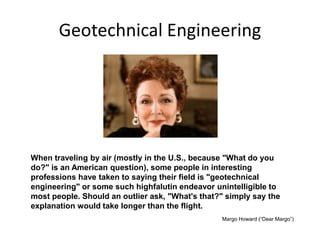The Ultimate Guide To Geotheta
The Ultimate Guide To Geotheta
Blog Article
The Single Strategy To Use For Geotheta
Table of ContentsSee This Report about GeothetaThe Geotheta PDFsLittle Known Questions About Geotheta.The Only Guide to GeothetaSome Ideas on Geotheta You Should Know

They conduct website investigations, collect samples, carry out lab examinations, and evaluate information to review the viability of the ground for construction projects - Geo Tech Engineering. Based upon their searchings for, geotechnical designers offer suggestions for foundation style, incline stability, preserving frameworks, and reduction of geotechnical risks. They team up with other experts, such as designers, architectural engineers, and building teams, to guarantee that geotechnical considerations are integrated into the general project design and execution
By evaluating the behavior and buildings of soil and rock, they can recognize possible geotechnical risks such as landslides, soil negotiation, or incline instability. Their proficiency aids protect against failures or mishaps that might endanger lives and building. Below are some comprehensive duties and duties of a geotechnical designer: Site Investigation: Geotechnical engineers conduct site examinations to collect data on subsurface problems.
They analyze the information to understand the residential properties and habits of the dirt and rock, including their stamina, permeability, compaction features, and groundwater problems. Geotechnical Evaluation and Layout: Geotechnical designers examine the data collected throughout website investigations to evaluate the security and suitability of the website for building projects. They execute geotechnical estimations and modeling to evaluate variables such as birthing capability, settlement, slope stability, side planet pressures, and groundwater circulation.
The 45-Second Trick For Geotheta
Structure Style: Geotechnical engineers play a crucial duty in making structures that can securely sustain the desired structure. They examine the soil problems and tons needs to establish the ideal foundation type, such as superficial foundations (e.g., grounds), deep foundations (e.g (https://www.abnewswire.com/companyname/geotheta.com_139529.html#detail-tab)., piles), or specialized techniques like soil renovation. They take into consideration factors such as negotiation limitations, birthing ability, and soil-structure interaction to establish optimal structure layouts
They evaluate construction strategies, display website tasks, and perform area evaluations to validate that the style recommendations are adhered to. If unanticipated geotechnical concerns emerge, they evaluate the situation and supply suggestions for remediation or adjustments to the layout. Danger Analysis and Mitigation: Geotechnical engineers evaluate geotechnical dangers and risks connected with the job website, such as landslides, liquefaction, or dirt disintegration.

Collaboration and Communication: Geotechnical engineers function carefully with other professionals associated with a project, such as designers, structural designers, and building groups. Reliable interaction and partnership are vital to integrate geotechnical considerations into the total project style and building procedure. Geotechnical engineers provide technological experience, response inquiries, and ensure that geotechnical needs are met.
How Geotheta can Save You Time, Stress, and Money.
Right here are some types of geotechnical engineers: Foundation Engineer: Foundation engineers focus on developing and assessing structures for structures. They evaluate the dirt problems, load demands, and website characteristics to figure out one of the most appropriate structure type and design, such as superficial foundations, deep foundations, or specialized methods like stack structures.
They assess the variables affecting slope stability, such as dirt residential or commercial properties, groundwater problems, and incline geometry, and create strategies to stop incline failures and mitigate dangers. Quake Engineer: Earthquake engineers specialize in evaluating and developing structures to hold up against seismic pressures. They evaluate the seismic hazard of a website, review soil liquefaction capacity, and establish seismic layout requirements to make sure the safety and security and strength of frameworks during quakes.
They carry out area screening, accumulate examples, and evaluate the collected information to identify the soil properties, geologic formations, and groundwater conditions at a site. Geotechnical Instrumentation Engineer: Geotechnical instrumentation engineers concentrate on tracking and gauging the actions of soil, rock, and frameworks. They mount and keep instrumentation systems that monitor aspects such as soil settlement, groundwater levels, slope movements, and structural variations to analyze performance and provide early warnings of prospective problems.
The Geotheta PDFs
They perform tests such as triaxial tests, debt consolidation examinations, direct shear examinations, and leaks in the structure examinations to gather information for geotechnical evaluation and design. Geosynthetics Designer: Geosynthetics designers specialize in the style and application of geosynthetic products, such as geotextiles, geogrids, and geomembranes. They use these materials to enhance dirt stability, enhance inclines, supply drain solutions, and control erosion.
They often tend to be investigatory individuals, which suggests they're intellectual, reflective, and analytical. They are interested, systematic, logical, analytical, and rational. Some of them are also social, indicating they're kind, generous, cooperative, individual, caring, helpful, understanding, skillful, and pleasant - Geo Tech Engineering.
In the workplace atmosphere, geotechnical designers make use of specialized software devices to execute computations, produce designs, and assess information. They prepare records, review task specifications, communicate with customers and group members, and coordinate job activities. discover here The workplace setup offers a helpful environment for research, analysis, and cooperation with other specialists associated with the job.
The Definitive Guide for Geotheta
They frequently visit project websites to carry out website investigations, assess geotechnical conditions, and collect information for analysis. These visits include traveling to different locations, in some cases in remote or tough surfaces. Geotechnical engineers may execute dirt sampling, conduct tests, and monitor building tasks to make certain that the geotechnical aspects of the project are being implemented correctly.
Geotechnical designers also work in specialized geotechnical research laboratories. Geotechnical research laboratory engineers function extensively in these environments, dealing with screening devices, operating tools, and taping information.
Report this page